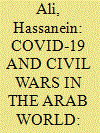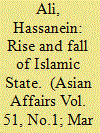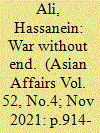|
|
|
Sort Order |
|
|
|
Items / Page
|
|
|
|
|
|
|
| Srl | Item |
| 1 |
ID:
182833


|
|
|
|
|
| Summary/Abstract |
The post-Arab Spring period witnessed the outbreak of devastating civil wars in Syria, Libya and Yemen. These wars had many disastrous impacts on these countries, which threatened their existence as political entities. The Covid-19 pandemic exacerbated the problems facing these countries, especially in light of the collapse of their infrastructure and health care systems. In spite of this, the pandemic and its consequences did not mitigate these civil wars. In this context, this article aims to answer the following question: Why do civil wars continue in the Arab world, despite the Covid-19 pandemic and its disastrous consequences? In other words, why didn't the pandemic create a new dynamic that pushes for the settlement of the civil wars in Syria, Libya and Yemen?
The article provides five reasons to explain this phenomenon. First, the worsening situation in Syria, Libya, and Yemen before the emergence of the Covid-19 pandemic, due to civil wars in these countries turning into protracted conflicts. Second, the nature of the civil wars as proxy wars, due to the large number of regional and international actors that have been involved in each of them. Third, the expansion of war economies in these countries; this phenomenon feeds civil conflict and sustains it. Fourth, the disintegration of the nation state in Syria, Libya, and Yemen, due to the absence of a strong central government, and the multiplicity of actors that control the state's territory. Fifth, the inefficiency of the means to peacefully settle Arab civil wars, mainly through the political efforts of the United Nations.
|
|
|
|
|
|
|
|
|
|
|
|
|
|
|
|
| 2 |
ID:
171872


|
|
|
|
|
| Summary/Abstract |
The Islamic State (IS) is one of the most prominent transnational terrorist jihadist organizations. In 2013 and 2014, IS was able to control large swaths of Syria and Iraq, roughly the size of Britain, and announced the establishment of what it called the “Caliphate State”. The organization was defeated militarily through a long war on the Iraqi and Syrian fronts. Many local, regional and international parties participated in this war. In October 2019, IS's leader, Abu Bakr al-Baghdadi, was killed in a US raid at his safe house in the Syrian province of Idlib. This article will discuss the reasons of the rapid expansion of the IS, analyze the sources of its strength and assess the repercussions of its military defeat and death of its leader on its ability to survive, as well as foreseeing its future.
|
|
|
|
|
|
|
|
|
|
|
|
|
|
|
|
| 3 |
ID:
183187


|
|
|
|
|
| Summary/Abstract |
On March 26, 2021, the civil war in Yemen entered its seventh year. Despite the multiple attempts made by the United Nations and other regional and international parties to end this war and launch negotiations leading to a comprehensive political settlement, these attempts have not yielded any tangible results, and the war continues.
|
|
|
|
|
|
|
|
|
|
|
|
|
|
|
|
|
|
|
|
|